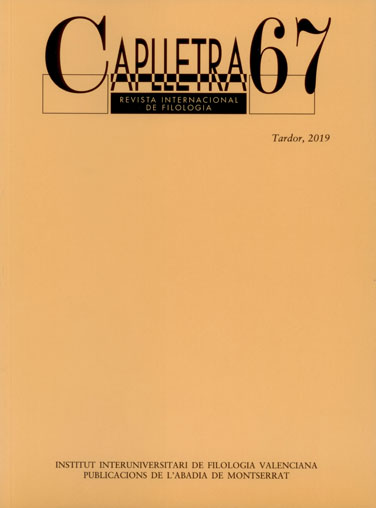The Ghostly Spirit’s Myth in Catalan «Modernisme»: transposition, unreality, and beliefs
DOI:
https://doi.org/10.7203/caplletra.67.15369Keywords:
Catalan Modernisme, Fantastic Catalan literature, Fantastic French literature, ghosts, embodied spirits, hipertextuality, beliefs Abstract
Abstract
This paper, being a contribution to the rarely studied fantastic literature written in Catalan, is an approach to two of the essential motifs of this literary mode — ghosts and embodied spirits. On the grounds of an interdisciplinary theoretical basis dealing with the human function of imagining, the objective of this paper is to analyze a small corpus of short story fiction written during the period of Catalan Modernisme. The unreal elements of these works determine which is their narrative mode and how their stories work. The corpus comprises two quite opposite short stories: one by M. Genís i Aguilar and the other one by J. Zanné. The aesthetic, ideological and religious aspects conditioning the rewritings of the myths or hypotexts are examined by applying several notions related to Genette’s literary hipertextuality.
 Downloads
Downloads
Downloads
Published
How to Cite
-
Abstract539
-
PDF (Català)444
Issue
Section
License
Authors submitting work to Caplletra for publication must be the legitimate holder of the usage rights. Legitimacy for the purposes of publishing the work must also include images, tables, diagrams and any other materials that may complement the text, whether they are the author of such material or not.
Copyright: on publishing their work in the journal, the author grants Caplletra. Revista Internacional de Filologia usage rights (reproduction, distribution and public communication) for both the paper printed version and for the electronic version.
All work published in Caplletra is covered by the Creative Commons license type Attribution-NonCommercial-NoDerivatives 4.0 (CC BY-NC-ND 4.0).
RESPONSABILITY
Caplletra. Revista Internacional de Filologia does not necessarily identify with the points of view expressed in the papers it publishes.
Caplletra. Revista Internacional de Filologia accepts no responsibility whatsoever for any eventual infringement of intellectual property rights on the part of authors.






